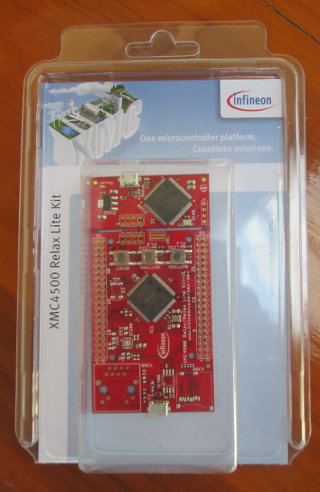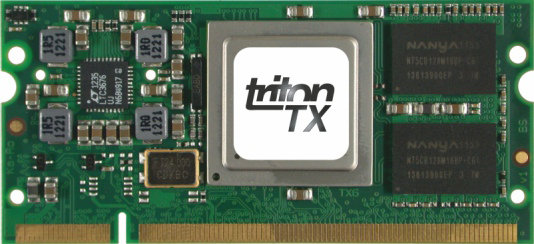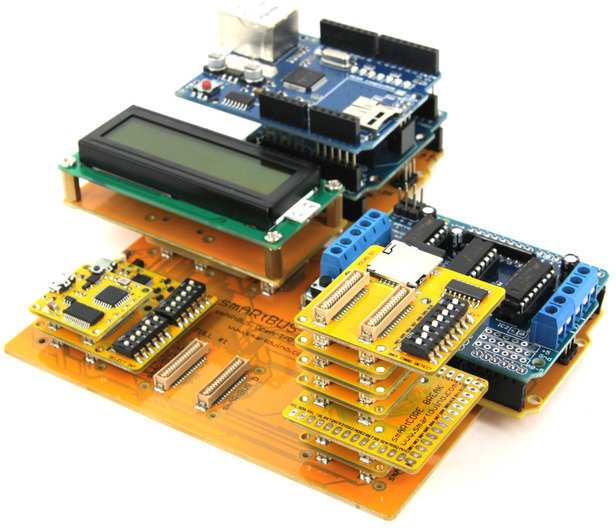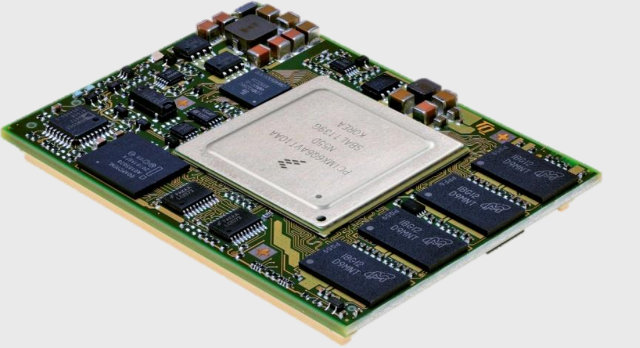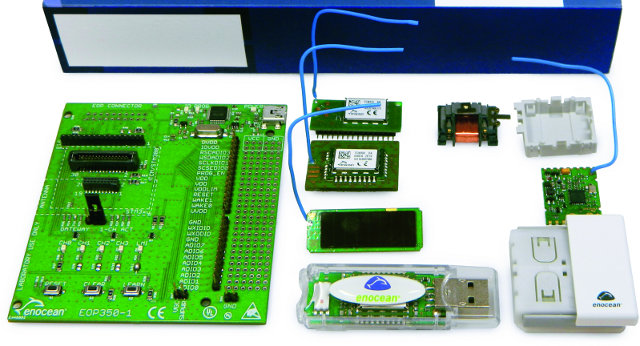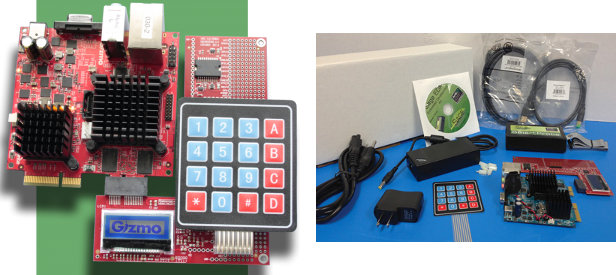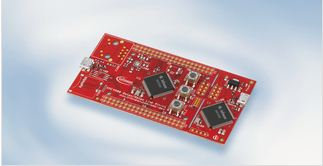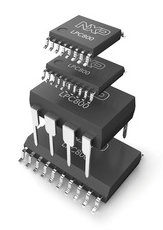Infineon Relax Lite Kit is a 10 Euros development kit based on Infineon XMC4500 Cortex M4 MCU with 160 KB SRAM and 1 MB flash, and featuring 2 USB OTG ports for debugging and powering up the board, 3 buttons (including reset), 2 LEDs, and 2 headers (through holes) giving access to the signals from the MCU such SPI, I2C, I2S, UART, CAN, ADC, DAC and PMW. The kit if available online via Hitec, but unless you live in Germany, this is not an interesting option, as international shipping costs over 100 Euros. So you’d better check local distributors in your country. The package only comes with the board, and you’ll need a USB to microUSB to power the board. To get started, simply connect the board via the USB cable to one of the USB OTG connectors, and to a Windows PC. The power LED (green) should lit up, […]
Direct Insight TRITON-TX6Q System-on-Module Powered by Freescale i.MX6Q
Direct Insight, a British company, has recently announced the TRITON-TX6Q, a SODIMM system-on-module based on Freescale’s iMX6Q quad core Cortex-A9 processor running at 1 GHz with 1 to 2GB RAM and 128 MB flash. This module targets embedded applications including medical devices, digital signage, and industrial multimedia products. Here are the TRITON-TX6Q specifications: SoC – Freescale i.MX6Q 4x ARM Cortex-A9 up to 1GHz + Vivante GC2000, GC355 and GC320 graphics co-processors System Memory – 1GB or 2GB 64-bit DDR3 @ 1066MHz Storage – 128MB NAND Flash, 2 SD card receptacles on baseboard Display Connection – LCD controller 24-bit parallel up to 1080p, dual LVDS (optional). Resistive & capactive touch screen support. Connectivity – Ethernet 10/100 BaseT with PHY on module. USB – USB Host + USB OTG Peripherals and Interfaces: Up to 5x UART (RS232) with pin sharing 2x I2C, 1x 1-wire and 2x SPI interfaces SSP (synchronous serial /digital audio): […]
smARtDUINO Open System Provides a Low Cost Modular Arduino Platform
smARtDUINO is a new platform design by the former ARDUINO’s manufacturer (Update: This claim appears to be incorrect and a lie) composed of several compact modules and is a fully funded project on Kickstarter (Less than 3 days remain to become a sponsor). The platform is not based on a single processor, architecture or language but, makes use of an universal platform that can be used to connect components originally developed from different companies, technologies and form factors. For example, it is possible to integrate modules, accessories or shields from Arduino, Netduino, ChipKit and even interact with smartphone using an ADK module, without having to use a breadboard and/or soldering. Interoperability is made possible thanks to what they call “smARtBUS Open I/O“, which is a standard for connectors designed after looking at existing (Arduino) platforms on the market. The company opted for 2 solutions composed of 2 connectors: smARtBUS BASIC […]
TQ Group TQMa6X Embedded Modules based on Freescale i.MX6 Processors
TQ Group has recently unveiled several TQMa6X embedded CPU modules that feature Freescale i.MX6 Solo, Dual and Quad processors, targeting screen, multi-touch, and multi-display applications as well as conventional controlling tasks. 3 modules are available: TQMa6S-AA – Single Cortex A9 / 1,2 GHz, 2 GB eMMC Flash, 512 MB DDR3, 64 kB EEPROM, -25°C…+85°C TQMa6D – Dual Cortex A9 / 1,2 GHz, 2 GB eMMC Flash, 512 MB DDR3, 64 kB EEPROM, -25°C…+85°C TQMa6Q – Quad Cortex A9 / 1,2 GHz, 2 GB eMMC Flash, 1 GB DDR3, 64 kB EEPROM, -25°C…+85°C TQMa6X modules share the following specifications: Processor – Freescale MCIMX6 Single/Dual/Quad Cortex A9 up to 1,2 GHz System Memory – Up to 2 GB DDR3 SDRAM Storage – Up to 64 GByte eMMC Flash, EEPROM: 0 / 64 kbit and up to 128 MB NOR-Flash. System interfaces: CAN – 2x FlexCAN ESAI (Enhanced Serial Audio Interface) Ethernet – 1x 10/100/1000 Mbit (IEEE […]
EnOcean EDK 350 Developer Kit For Energy Harvesting Wireless Solutions
EnOcean unveiled the EDK 350 developer kit which includes energy harvesting and wireless (RF) modules, and demonstrated the platform at Electronica 2012 on Future Electronics and Farnell booth. The new kit can help OEMs design batteryless applications quickly in a cost-effective manner for building and industry automation, smart homes and machine-to-machine systems. EnOcean EDK 350 Developer Kit includes the following modules: A universal programmer board (EOP 350) TCM 320 (transceiver module) STM 300 (universal wireless sensor module) ECO 200 (mechanical energy converter) PTM 330 (transmitter module for ECO 200) PTM 210/PTM 215 (energy harvesting switch module, PTM 215 includes data encryption function) STM 330 (energy harvesting temperature sensor module) USB 300 (USB wireless gateway) Wireless modules are normally available at frequencies of 315 MHz (for North America and countries following FCC specs) and 868 Mhz (for Europe and countries following R&TTE specs). The EDK 350 developer kit can be extended with […]
$199 GIZMO EXPLORER KIT – Embedded Development Kit Based on AMD G-Series G-T40E APU
I’ve just stumbled upon a low cost and open source embedded development kit featuring AMD G-Series G-T40E dual core APU that comes with the following: The Gizmo Board – A compact (10×10 cm) development board for powered by an AMD G-Series APU. The Explorer Board – An expansion I/O board providing an alpha-numeric keypad, a micro-display, and a breadboard area for prototyping and customization. Sage SmartProbe JTAG Development Tool – The kit includes the SmartProbe hardware and 20 hours of trial time use. Ethernet & USB Cables – The USB cable lets you connect the SmartProbe to your PC. The Ethernet cable is for networking connectivity, which can be used to access the SmartProbe as well. USB wall charger Power Supplyand Cable – A universal power supply for the Gizmo board, with a U.S.-standard cord. 6x standoffs with nuts Alpha-numeric keypad – To connect to the explorer board Installation DVD […]
Infineon Unveils Low Cost XMC4500 Relax & Relax Lite Kits For Cortex M4 XMC4500 MCUs
Infineon XMC4500 micro-controller family is based on ARM Cortex-M4 core @ 120 MHz, comes with 128 to 160 KB SRAM, 512 KB to 1 MB “Program Memory” as well as interfaces & peripherals, such as DMA, Ethernet, USB, ADC, DAC, SPI, I2C, I2S, UART and more. They are specifically designed for industrial applications supporting temperatures up to 125°C. The family was announced at Embedded World 2012 in February, and mass production started in May. This week at Electronica 2012, the company announced two low cost development kits for XMC4500 MCU: XMC4500 Relax Lite Kit (10 Euros): XMC4500 Microcontroller (ARM® Cortex™-M4F based) Detachable on-board debugger Power over USB ESD and reverse current protection 2 x user button and 2 x user LED 4 x SPI-Master, 3x I2C, 3 x I2S, 3 x UART, 2 x CAN, 17 x ADC (12 bit), 2 x DAC, 31x PMW mapped on 2 Pin Headers […]
NXP Launches Cortex M0+ LPC800 MCU and $15 LPC812-LPCXpresso Board
Following ARM Cortex M0+ announcement in March 2012, NXP Semiconductors has just announced the LPC800, tiny 32-bit MCUs based on Cortex M0+ core @ 30 MHz designed to replace 8-bit MCUs, together with LPCXpresso development board for the LPC800. The MCUs come with 1 to 4KB SRAM, 4 to 16 KB Flash, several serial interfaces and are available in SO20, TSSOP20, TSSOP16 and even DIP8 packages. Here are the key features of NXP new ultra low power 32-bit MCU family: ARM Cortex-M0+processor up to 30 MHz, software compatible with Cortex M0, M3 and M4 cores Memories: 4 to 16 kB Flash (with 64 Byte page size) 1 to 4 kB SRAM Serial Peripherals: Up to 3 USART interfaces Up to 2 SPI controllers 1x I2C-bus interface Timers: Multiple-channel multi-rate timer (MRT) State Configurable Timer (SCT) Self Wake-up Timer (WKT) clocked from either the IRC or a low-power clock source Windowed […]


